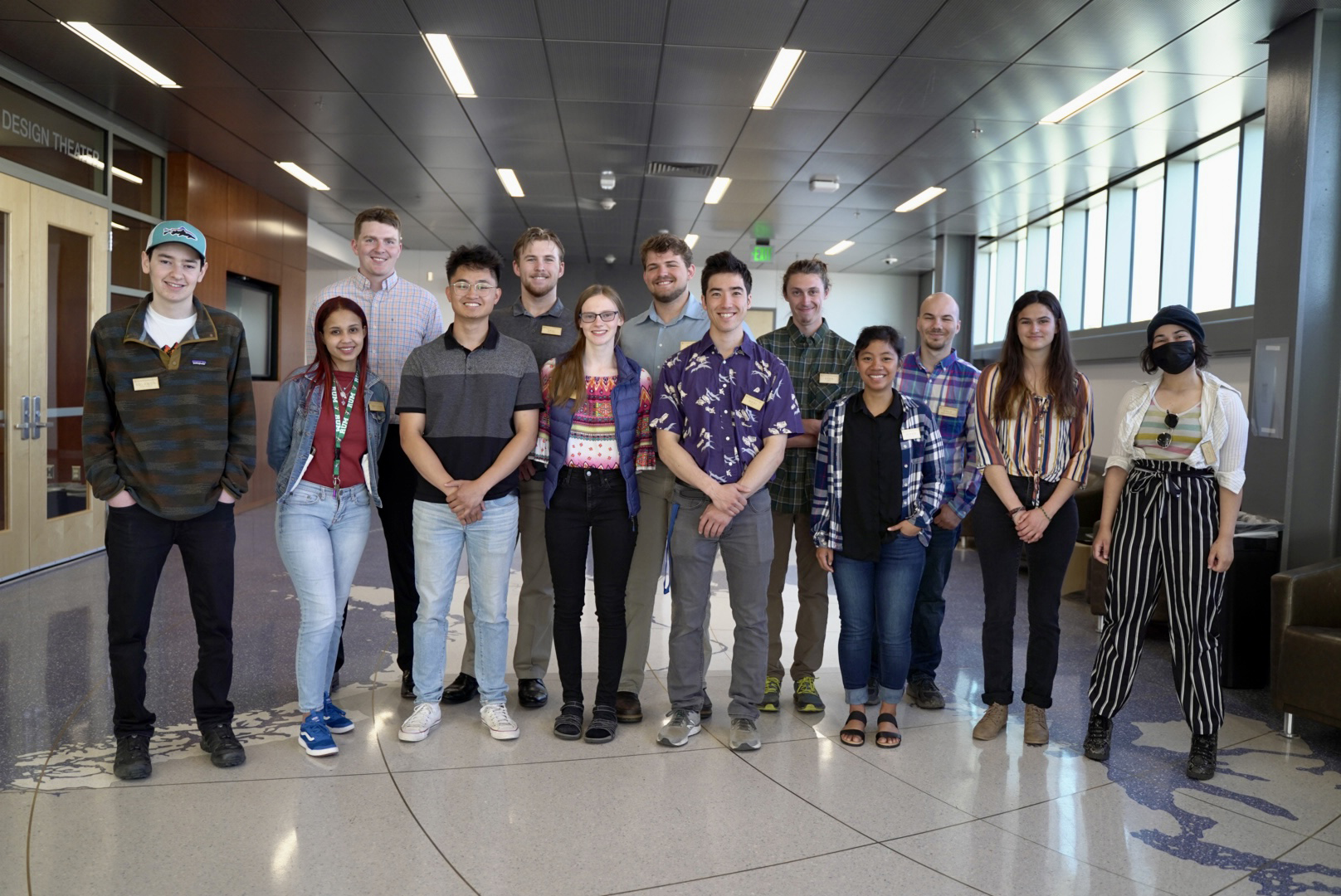Students gain energy research experience through ACEP Undergraduate Summer Internships

Alaska Center for Energy and Power Undergraduate Summer Internship program interns take a moment to pose on their first day of work at the Fairbanks ACEP office.
Alaska Center for Energy and Power’s summer interns have arrived, and they are wasting no time getting their hands deep into research. The research-focused program provides an opportunity for undergraduate students to gain hands-on research experience and skill development in the energy industry.
Students are mentored by ACEP faculty members on specific research projects as they participate in hands-on research with fieldwork, field trips, and professional development throughout the summer. Their research topics span the entire spectrum of ACEP’s work.
Fifteen undergraduate students from Alaska, South Dakota, California and Puerto Rico, mostly pursuing engineering degrees, were selected to participate in this year’s internship program. This will be the first time in two years that interns will work in person at the Â鶹¹ÙÍø Fairbanks and Â鶹¹ÙÍø Anchorage. Last summer’s internship, which focused on supporting utility companies throughout Alaska, was conducted remotely and virtually due to coronavirus restrictions.
The ACEP team is excited to have the energy that the interns bring to the office and can’t wait to see them develop their research skills throughout the summer. ACEP’s newsletter ACEP This Week will spotlight the interns and the work they are doing throughout the summer.
Intern projects this summer:
Data Collection & Management Support (Mentor: Dayne Broderson. Intern: Solomon Himelbloom) — Work with ACEP’s computer and information research scientists to support energy researchers.
Project for Refrigerator Efficiency (Mentor: David Denkenberger. Intern: Osias Salem) — Build a heat exchanger prototype that will make a refrigerator more efficient using 3D printer and laser welder technology.
Micro Nuclear Reactor Modeling in Alaska (Mentor: David Denkenberger. Intern: Gus Lewis) — Model micro nuclear reactors in applications, including small military bases, university campuses, remote mines and hub communities.
Integrated Renewables in Greenhouses (Mentors: Daisy Huang and Michelle Wilber. Intern: Mori Hays) — Â鶹¹ÙÍø issues related to integrating renewables into greenhouses and gaining hands-on technical experience with design and construction of research infrastructure, including thermal meters for greenhouses, control systems and solar panel installations on greenhouses.
Alaska Remote Microgrid Power System Simulations (Mentor: Mariko Shirazi. Intern: Cam Twarog) — This project is a continuation of previous work on medium voltage DC inverters connecting rural Alaska communities. Work will include developing and validating power electronic controller hardware in the loop and/or developing AutoCAD drawings for a 500-kilowatt-scale microgrid test bed.
Coastal Mapping/Hydrokinetic Characterization (Mentor: Erin Trochim. Interns: Joy Lomelino and Evan Joyce) — Focus on environmental characterization necessary for hydrokinetic energy applications, as well as using remote sensing data to monitor coastal change and conduct fieldwork to understand site variability.
Arctic Energy Atlas (Mentor: Erin Trochim. Intern: Alejo Gonzalez) — Help build onto the 2021 Arctic Energy Atlas, which characterizes energy across the Arctic, and develop new ways of updating renewable energy sources for the atlas.
Cold Climate Electric Vehicle Data Analysis (Mentor: Michelle Wilber. Intern: Michael Lindemann) — Analyze recent data on electric vehicles in Anchorage, Fairbanks and other communities, and investigate how energy usage varies in different conditions.
Wind Energy and Grid Services in Alaska (Mentor: Phylicia Cicilio. Intern: Leif Bredeson) — Assist with the evaluation of two aspects of wind energy integration: 1) evaluating wind resource potential along the Railbelt transmission corridor, and 2) evaluating grid services that can be provided by wind generators with or without energy storage.
Community Solar Â鶹¹ÙÍø in Support of Solarize (Mentor: Chris Pike. Intern: Cole Sudkamp Walker) — Support existing Solarize tasks, and lead on specific Solarize tasks in areas of professional interest and skill. Duties include conducting project surveys, managing energy-efficiency components, conducting site visits on solar photovoltaic installations and developing marketing/outreach materials.
Co-Developed Electrical Engineering Â鶹¹ÙÍø Project (Mentor: Mohammad Kapourchali. Intern: Melody Cosme Morales) — This project aims to provide an opportunity to apply analytical optimization techniques (both deterministic and stochastic) to economic dispatch and unit commitment problems. As a result of this research and code development work, different decarbonization pathways can be evaluated for Alaska's Railbelt electric grid.
Kotzebue Energy Infrastructure Mapping and Modeling — (Mentors: Mariko Shirazi, Phylicia Cicilio and Dayne Broderson. Intern: Lindy Guernsey) — This project focuses on retrieving data from the Kotzebue Electric Association infrastructure through fieldwork and, in turn, creating GIS maps and electrical models with QGis, PowerFactory and HOMER software programs. The goal is to provide KEA with models and analysis to assist it in increasing renewable generation while maintaining a reliable grid.
The AUSI program is generously funded by a grant from the .
For more information on the AUSI program and the various projects, please contact Jeff Fisher at jfisher3@alaska.edu and visit .


